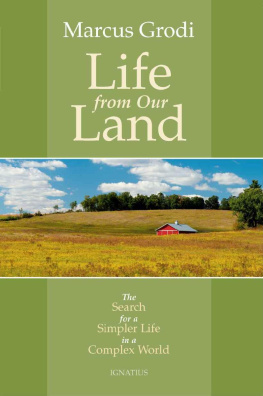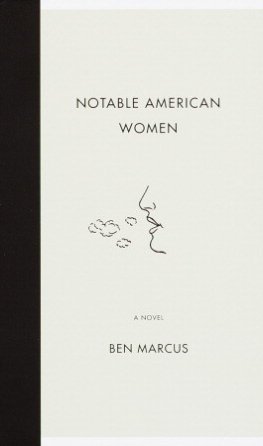LIFE FROM OUR LAND
Marcus Grodi
LIFE FROM OUR LAND
IGNATIUS PRESS SAN FRANCISCO
Unless otherwise noted, Scripture quotations are from the Revised
Standard Version of the BibleSecond Catholic Edition (Ignatius Edition),
copyright 2006 by the National Council of the Churches of Christ in the
United States of America. All rights reserved.
Excerpts from the Catechism of the Catholic Church , second edition,
2000 by Libreria Editrice Vaticana-United States Conference of
Catholic Bishops, Washington, D.C. All rights reserved.
Epigraph from The Magicians Nephew by C. S. Lewis
1955 by C. S. Lewis Pte. Ltd. Used with permission.
Cover photograph:
Ohio Farmland
Shutterstock / Cynthia Kidwell
Cover design by Davin Carlson
2015 by Ignatius Press, San Francisco
All rights reserved
ISBN 978-1-62164-023-3 (PB)
ISBN 978-1-68149-682-5 (E)
Library of Congress Control Number 2014959902
Printed in the United States of America
It is when I possess least that I have the fewest worries, and the Lord knows that, as far as I can tell, I am more afflicted when there is excess of anything than when there is lack of it.
Teresa of vila, The Way of Perfection
Property, wealth, diversions, amusements are often obstacles to the attainment of truth, beauty, celebration, delight, and love. They are not evil in themselves, of course, but the fact is that they allure us to fasten on them for themselves. They become finite crutches that distract and lead us away from our genuine quenching. Pulled to them, we cannot be pulled to God.
Thomas Dubay, Happy Are You Poor
There are two wings that raise a man above earthly thingssimplicity and purity. Simplicity must inspire his purpose, and purity his affection. Simplicity reaches out after God; purity discovers and enjoys Him.
Thomas Kempis, The Imitation of Christ
See that your praise comes from your whole being; in other words, see that you praise God not with your lips and voices alone, but with your minds, your lives and all your actions.... You cease to praise God only when you swerve from justice and from what is pleasing to God. If you never turn aside from the good life, your tongue may be silent but your actions will cry aloud, and God will perceive your intentions; for as our ears hear each others voices, so do Gods ears hear our thoughts.
Augustine, A Discourse on the Psalms
I give to you forever this land of Narnia. I give you the woods, the fruits, the rivers. I give you the stars and I give you myself.
Aslan in C. S. Lewis The Magicians Nephew
CONTENTS
PREFACE
Then they were glad because they had quiet, and he brought them to their desired haven .
Psalm 107:30

Our family left the city for the country. So begin dozens if not hundreds of books written and published during the past seventy-five years, all in the aftermath of the experiences of thousands of idealistic back-to-the-earth folk seeking a simpler life. This short book, however, is not a journal or an autobiography about my familys move to our rural land far off the beaten path. If it were, a better title might have been Life on Our Land . Though this book does include autobiographical snippets, I do not intend to give here a running account of our successes and failures; for that you can watch old episodes of Green Acres or peruse the many books and websites on this topic. Five of my favorite books include two classics entitled The Egg and I , by Betty MacDonald (Lippincott, 1945), and We Took to the Woods , by Louise Dickinson Rich (originally published 1942); and three more recent publications, Up Tunket Road , by Philip Ackerman Leist (Chelsea Green Publishing, 2010), The Dirty Life , by Kristin Kimball (Scribner, 2011), and Growing a Farmer: How I Learned to Live Off the Land , by Kurt Timmermeister (W. W. Norton, 2012).
Nor is this book an apologetic for leaving the city for a self-sustaining, off-the-grid, nonelectric, rural life of farming. Again, there are many books, good and not so good, promoting this agenda, by great rural-life apologists like Gene Logsdon, Joel Salatin, David Kline, Louis Bromfield, Wendell Berry, and Eric Brende. Four of my favorites of this genre are The Contrary Farmer , by Gene Logsdon (Chelsea Green, 1995); Folks, This Aint Normal , by Joel Salatin (Center Street, 2011); Small Is Beautiful , by E. F. Schumacher (originally published 1973); and Small Is Still Beautiful , by Joseph Pearce (Intercollegiate Studies Institute, 2006). I suppose a little of this comes through in my writing, but this is far from my intent or agenda.
Neither is this a book about how to farm! Fortunately, there is an endless supply of books and websites on that topic, many of which I have consulted over and over and yet have only scratched the surface of what it means to be a farmer. My favorite books on farming are by authors such as Logsdon, Salatin, Karl Schwenke, Eliot Coleman, Brett L. Markham, Carla Emery, Richard W. Langer, Carleen Madigan, Tanya Denckla, Julius Ruechel, and Dirk van Loon. Two that I particularly enjoyed are the classic Five Acres and Independence , by M. G. Kains (Greenberg, 1935), and Memories of a Former Kid: Once Upon a Time on the Family Farm , by Bob Artley (Voyageur Press, 1978). There are far too many helpful websites to list here, so Ill mention just a few favorites: The One-Cow Revolution, The Distributist Review, Callens Honey Farm , and New Catholic Land Movement .
Ive entitled this book Life from Our Land because I want to share what we have learned about life and, maybe more importantly, what we have discovered about how we ought to be living our lives, from having the privilege of living out here on our land. It may be that I could not have discovered most of this if I had remained in the city, but this is only because of the depth of my own obtuseness. You might already know all of what I hope to say and likely more, and have discovered it right where you are living now, in a twentieth-floor condo, at a busy intersection in downtown Cleveland. But just in case you dont, Im passing these thoughts along for your consideration, comment, and critique.
For years I thought there was nothing new under the sun, but then I started paying attention to the landscape, the geography, and the rhythms around me. It not only awed me; it also helped me to see how God works through creation. Im a believer! But Im also a forgetter, and I have come to realize that nature is a great reminder. I am sharing this as a fellow traveler, hoping that we can help each other proceed more faithfully as we walk along together, through what I believe is a very difficult and precarious age, to our final destination.
Because Ive always been a voracious reader, its often difficult to pinpoint the sources of many of my reflections, but there are two books (besides the Bible) that have had the greatest impact on my thinking. The first is an ever living classic: Thomas Kempis Imitation of Christ . The second is a contemporary that I think should become a classic: Thomas Dubays Happy Are You Poor .
The list of those I would like to thank, whether living or dead, is nearly infinite. Mostly I want to thank my wife, Marilyn, who, in addition to standing beside me (and doing her best to put up with me) through all of this, made this book far more accurate and readable through her proofing; my sons, Jon Marc, Peter, and Richard; and the precious new additions to our family, Teresa, Dominic, and Lucy, who also have shared this continuing journey with us. I also am grateful to Marilyns sister, Holly, and her helper and friend, Tiny, for their insight into and assistance with all aspects of our acclimation to life on this land. We thank the cattle, sheep, pigs, chickens, cats, dogs, horse, and myriad of birds that have provided the challenges of this rural experiment, but I presume it will be many years before this text will be translated into their dialects. Also, I am eternally grateful for the editorial corrections and comments of Jeanette Flood. To the extent that this former sows ear collection of articles has any semblance to a silk purse is due mostly to her editorial skills! I also especially thank my staff at the Coming Home Network International who have bandied my ideas about, helping me hone them into something more presentable. And finally, my thanks to our many good friends who, like my family and me, are trying at different levels to fight the good fight of the faith in our modern culture, both in rural and city settings: the families Cross, Madrid, Ryland, Cano, Horn, Moses, Dougherty, Evans, Hahn, Welker, Pearce, Sullivan, Ellis, et cetera, et cetera.
Next page






